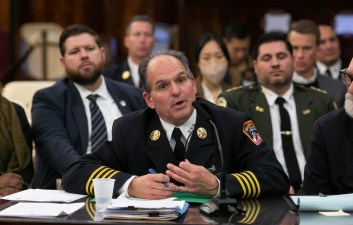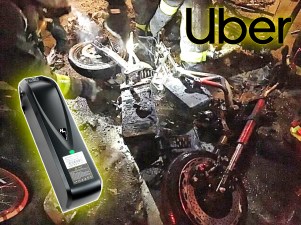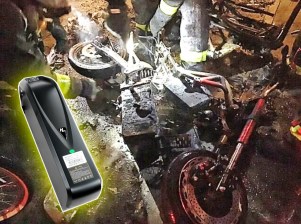FDNY Wants Feds to Ban Faulty Lithium-Ion Batteries From Entering U.S.

City officials beset by a surge in fires caused by lithium-ion batteries used in e-bikes and other electronic devices are now calling on the feds to intervene — by reining in manufacturers and seizing imported hardware that doesn’t meet industry standards.
In a letter to the head of the federal Consumer Product Safety Commission, FDNY Commissioner Laura Kavanagh wrote late last week that the top consumer regulator should “be proactive in … seizing imported devices at the ports that fail minimum industry standards, levying penalties against manufacturers who fail to inform [regulators] of hazards posed by their products, and seeking additional recalls of unsafe products.”
It’s an important change in tactic for the FDNY, which up until now has simply been fighting fires sparked by the power units and warning New Yorkers (and building owners) of their danger. The FDNY blames 22 blazes this year on the essential batteries that fuel the micro-mobility revolution, yet can be dangerous if improperly used.
To stop the carnage, the feds should further ban the sale of “universal” chargers that are not designed for specific batteries — and make it more difficult for consumers to open the actual batteries themselves in order to tamper with or replace them, Kavanagh wrote.
“There are basic steps that can make e-micromobiity devices safer while not significantly increasing the cost to consumers,” she said. “The FDNY is on the front lines of this fight against deadly fires involving batteries in e-micromobility devices and we are grateful for every tool available to help.”
Members of Los Deliveristas Unidos, a delivery worker collective fighting for better working conditions, plan to launch an education campaign in the next few weeks to address the fires, according to Gustavo Ajche, a delivery worker and union leader.
Workers agree that manufacturers must comply with safety regulations, Ajche told Streetsblog.
On Friday February 10, Fire Commissioner Laura Kavanagh sent a letter to the U.S. Consumer Product Safety Commission highlighting additional concerns and safety measures that are needed to effectively address this problem. Read more: https://t.co/us1xRZOUY3 pic.twitter.com/6uinQgVw9Z
— FDNY (@FDNY) February 13, 2023
This year’s lithium-ion battery fires have led to 36 injuries and one death, according to FDNY. Last year, 216 fires caused 147 injuries and six fatalities, according to city stats.
In 2019, when e-bikes became legal on city streets, there were 28 fires causing 16 injuries and zero deaths, according to the FDNY.
FDNY has not determined how many of the fires associated the batteries are the result of e-bikes as opposed to ubiquitous items like laptops, scooters, iPhones, or Citi Bikes.
Kavanagh’s letter came after private buildings and institutions across the city have already taken action by banning e-mobility devices of all kinds — a move that some residents and advocates believe will only hurt delivery workers the greater momentum of e-mobility devices.
“There are fires that are causing real harm. That’s a challenge,” Shabazz Stuart, the founder and CEO of Oonee, a secure bike parking company, told Streetsblog back in December.
“On the other hand, e-bikes are overwhelmingly really safe and you got people who are relying on e-bikes for their livelihoods, and you got a climate change revolution that relies on divesting from cars that kill way more people than e-bikes do. These are two sides of a complicated issue.”
City Council members are also working to pass legislation to ban the sale of both second-use batteries or ones that are not nationally recognized by an approved organization, such as Underwriters Laboratory (UL).
A rep for the Consumer Product Safety Commission said the agency is reviewing the letter.





